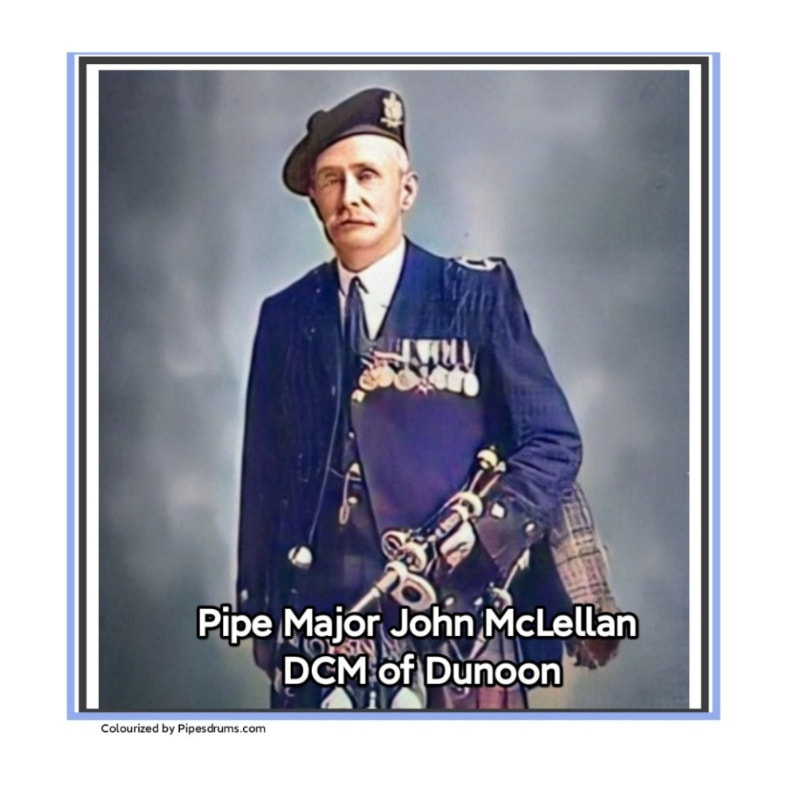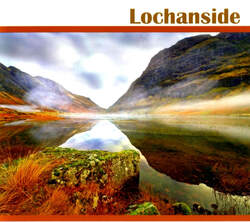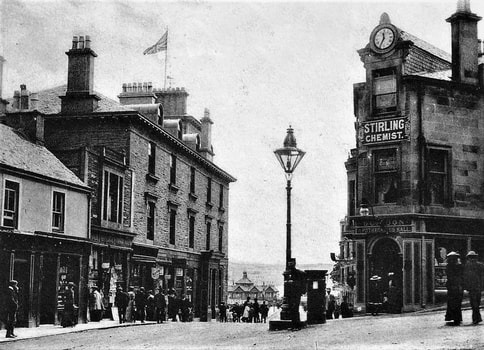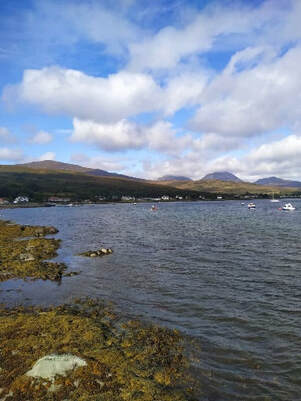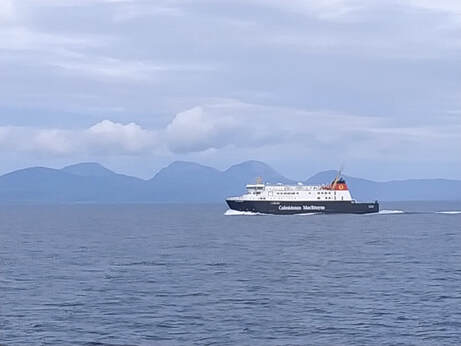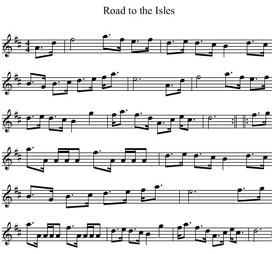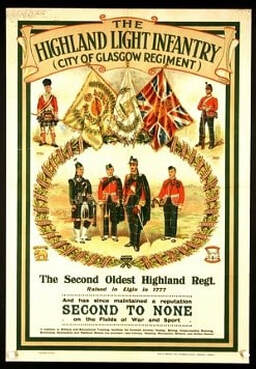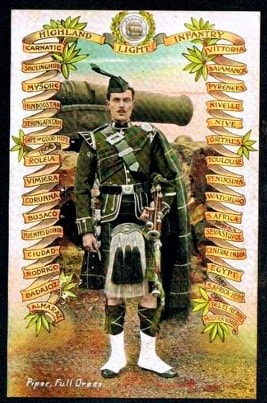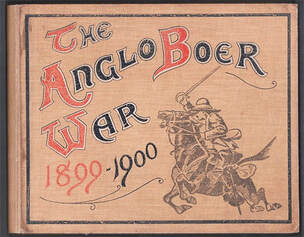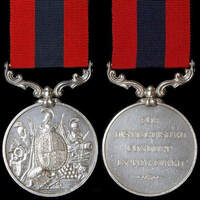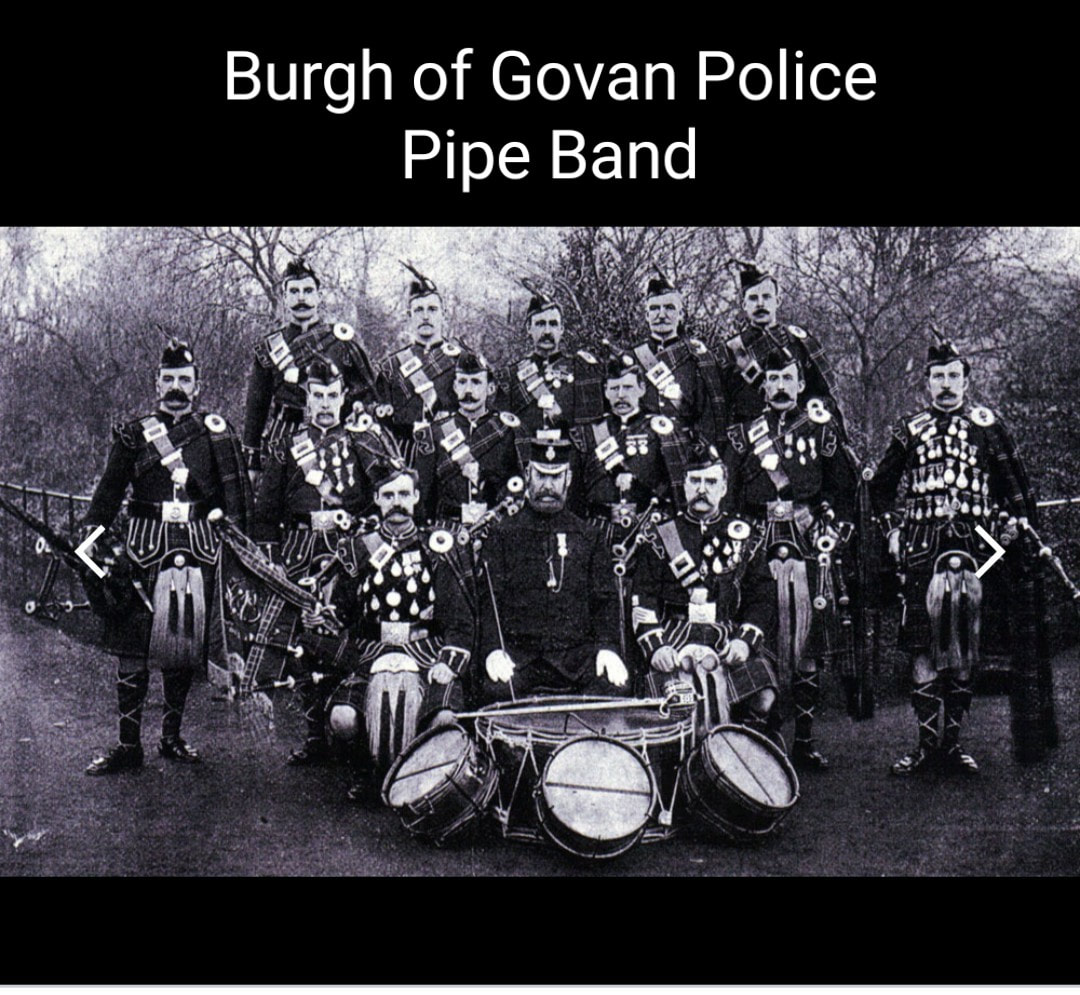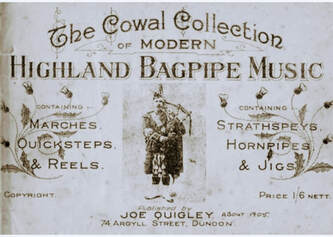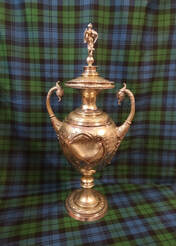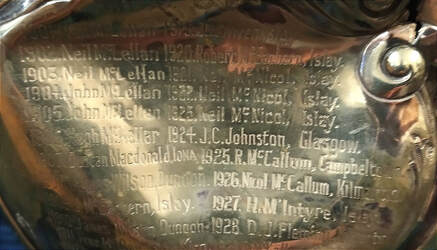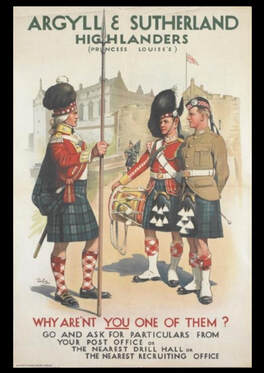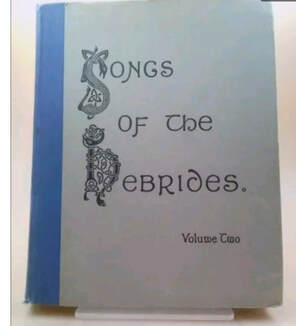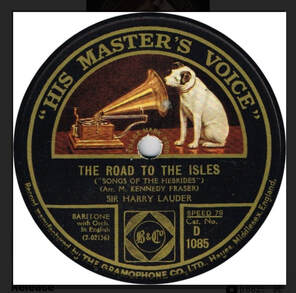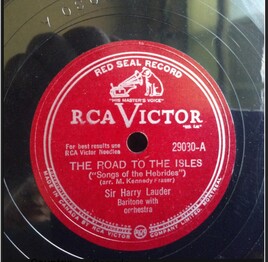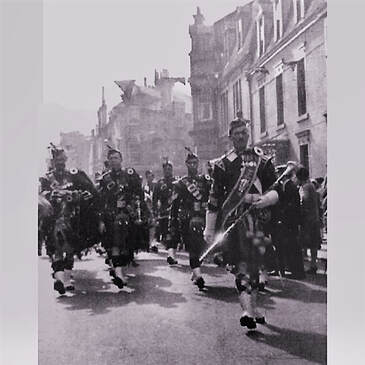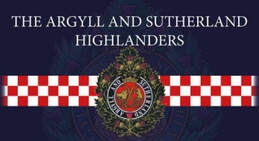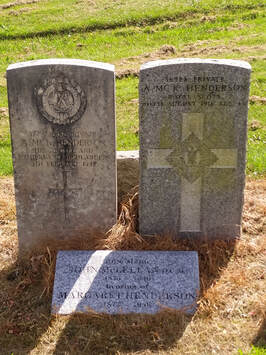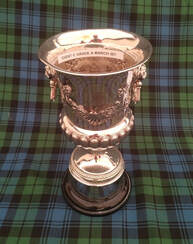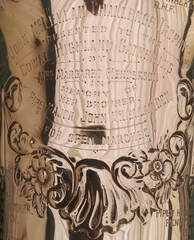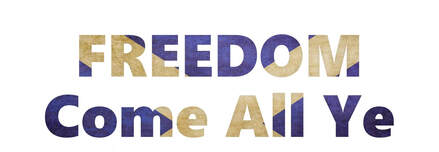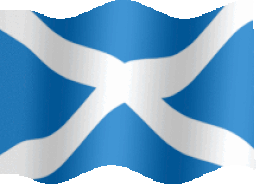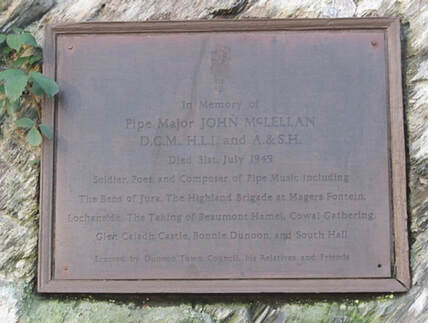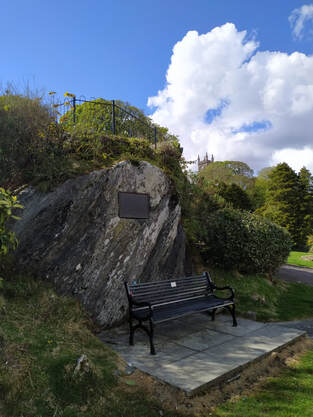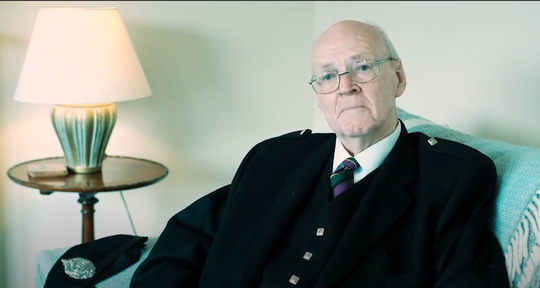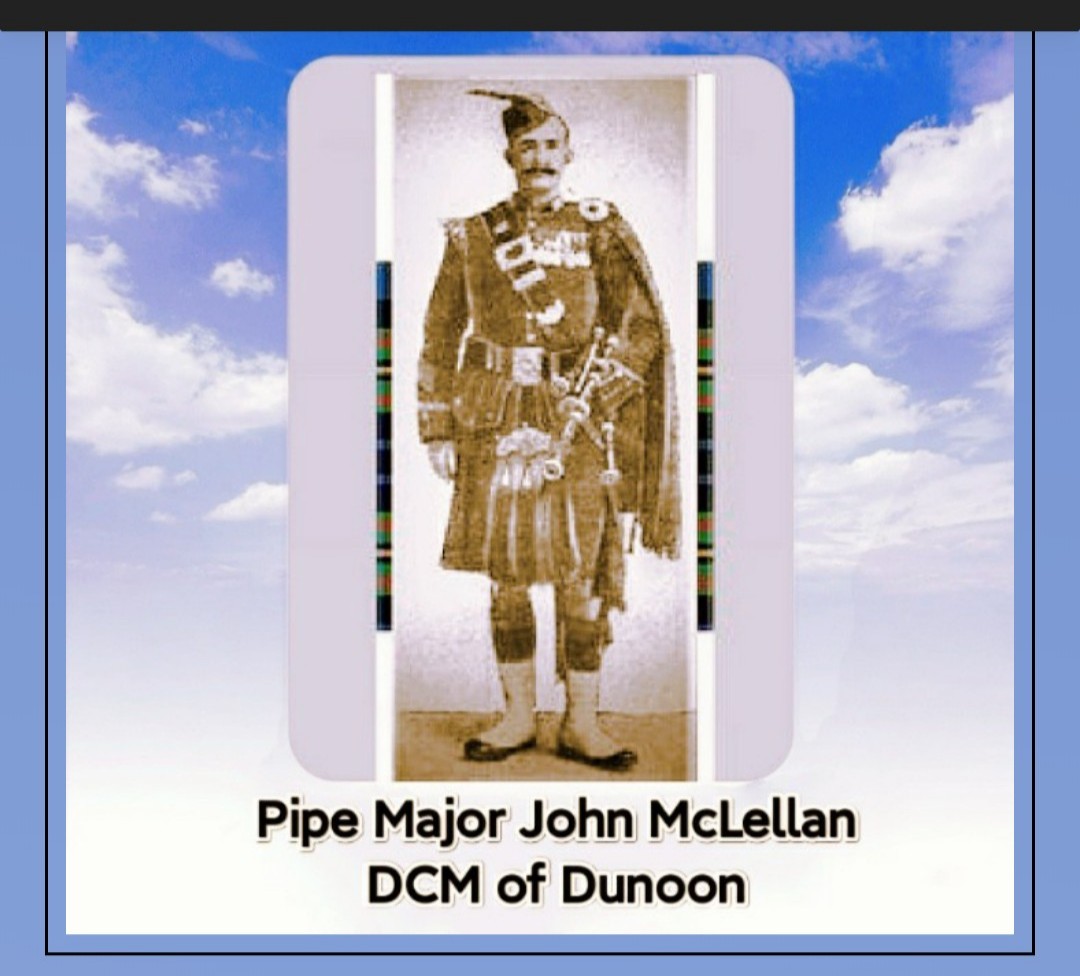Pipe Major John McLellan DCM of Dunoon
was born in the lovely wee town of Dunoon,
located on the Cowal Peninsula in Argyll,
Scotland. UK.
Known to pipers as John McLellan, Dunoon.
John, or Jock as he was known to his family & friends,
was a very talented musician, music composer,
lyricist & poet who was born in the town
on the 8th of August, 1875.
He was Dunoons best known composer
of pipe music, songs and poetry.
And is fondly remembered for composing
the music to the very popular songs
'The Road to the Isles', 'Lochanside'
and 'Freedom, Come All Ye' also known as
The Bloody Fields of Flanders.
was born in the lovely wee town of Dunoon,
located on the Cowal Peninsula in Argyll,
Scotland. UK.
Known to pipers as John McLellan, Dunoon.
John, or Jock as he was known to his family & friends,
was a very talented musician, music composer,
lyricist & poet who was born in the town
on the 8th of August, 1875.
He was Dunoons best known composer
of pipe music, songs and poetry.
And is fondly remembered for composing
the music to the very popular songs
'The Road to the Isles', 'Lochanside'
and 'Freedom, Come All Ye' also known as
The Bloody Fields of Flanders.
Born in the town's St Andrew's Street,
on August 8th 1875.
John McLellan was one of a family of six
children all born in Dunoon.
He had three sisters & two brothers, namely Sarah, Archibald, Margaret, Neil and Ann.
His parents were Neil McLellan &
Mary Darroch McLellan who hailed
from the islands of Islay and Jura respectively.
They came to the Scottish mainland to find work in 1869, and after marrying in Greenock,
they decided to settle in Dunoon.
Unfortunately, when John was only 8 years old,
his father became seriously ill and tragically died of pneumonia, while still in his early 40's.
After that terrible event, it appears that John's mother decided it was best for them to return to her native Jura
and remain there for a period of time, before eventually returning to Dunoon.
John spent his formative years growing up in Dunoon
and on the Isle of Jura with his family,
and these are the places where he learned to play the bagpipes, and a few other musical instruments too.
He also learned to read music, though there aren't any records from that time to tell us who taught him,
or indeed who helped him develop his amazing talent.
A lovely view which looks across Small Isles Bay on Jura to the Paps of Jura. Photo D*Mac
Recent research has revealed that John's mother,
Mary Darroch was the most likely person to have had
a very big influence on his early musical development
and may also have had a hand
in his early music education as she was
a very talented pianist
who also liked to compose her own tunes.
Mary Darroch McLellan's most famous composition is a melodic slow air titled 'Bonnie Isle of Jura'.
(Please click on the tunes title to listen to a music sample @ Pipe Tunes.)
Mary Darroch was the most likely person to have had
a very big influence on his early musical development
and may also have had a hand
in his early music education as she was
a very talented pianist
who also liked to compose her own tunes.
Mary Darroch McLellan's most famous composition is a melodic slow air titled 'Bonnie Isle of Jura'.
(Please click on the tunes title to listen to a music sample @ Pipe Tunes.)
The ferry to the Isle of Islay passing the Paps of Jura.
(Photo taken by D*Mac)
(Photo taken by D*Mac)
John grew up to be a multi-talented individual who enjoyed playing the piano, the penny whistle, the fiddle
and of course the bagpipes.
All to a very high standard!
His time spent growing up in Dunoon and also on the enchanting Isle of Jura
really made a very big impression on him,
because on reaching his teen years
he started composing a number of memorable tunes
Which he named after various places
in Argyll and around the Cowal Peninsula.
Also on the Isles of Islay and Jura.
In 1891, Jock celebrated his 16th birthday and shortly after that event he composed a tune with a lovely melody
which he dedicated to his mother Mary Darroch.
He named the tune 'The Bens of Jura', though
over the next two decades or so
his tune would become known by many different names,
today it's better known as 'The Road To The Isles'.
A few other tunes that Jock may have composed around that time includes: 'The Paps of Jura,'
'The Shores of Argyll', 'The Holy Loch', 'Men of Argyll'
and 'The Maids of Jura'.
In 1892, John turned 17 years old, and it was then that he decided to join the army.
He travelled up to Glasgow and signed up with the Highland Light Infantry (HLI)
which was an infantry regiment of the British army, and after a few years of training
at various places around the UK, he was sent
overseas to Malta.
According to archive records, the H.L.I. did service in a
number of countries. After Malta they were posted to Crete
to help quell disturbances there, before moving on to Egypt.
John's most famous melody at that time was entitled
'The Burning Sands of Egypt',
though today that tune is known as 'The Road to the Isles'.
According to archive records, the H.L.I. did service in a
number of countries. After Malta they were posted to Crete
to help quell disturbances there, before moving on to Egypt.
John's most famous melody at that time was entitled
'The Burning Sands of Egypt',
though today that tune is known as 'The Road to the Isles'.
*In 1899, the 1st battalion of the HLI was bound for the South African War as one of the units of the Highland Brigade.
The 2nd Anglo-Boer War lasted four years and the Highland Brigade was in the thick of the fighting.
*In 1899, the 1st battalion of the HLI was bound for the South African War as one of the units of the Highland Brigade.
The 2nd Anglo-Boer War lasted four years and the Highland Brigade was in the thick of the fighting.
It was at one of these early battles that John won the Distinguished Conduct Medal (DCM) for bravery.
It's said that he took a bullet in the ankle while playing the bagpipes on the battlefield.
While badly injured he continued to rally the troupes by playing his pipes and motivating them onwards.
Later, he composed the famous and well-loved Retreat Air
'The Highland Brigade at Magersfontein'
to commemorate the battle.
John left the army in 1903, and after his return to Scotland,
he teamed up with his young brother Neil, and they joined
the Burgh of Govan Police Pipe Band.
Later, this band became the City of Glasgow
Police Pipe Band
and eventually the Strathclyde Police Pipe Band.*
It appears that Jock only played with the Burgh of Govan Police Pipe Band till 1904, after which time he returned to Dunoon
where he became a teacher of the bagpipes
and continued to compose his tunes and songs,
many of which he contributed to the premiere edition
of 'The Cowal Collection of Modern Highland Bagpipe Music'
a popular tune-book published in 1905.
he teamed up with his young brother Neil, and they joined
the Burgh of Govan Police Pipe Band.
Later, this band became the City of Glasgow
Police Pipe Band
and eventually the Strathclyde Police Pipe Band.*
It appears that Jock only played with the Burgh of Govan Police Pipe Band till 1904, after which time he returned to Dunoon
where he became a teacher of the bagpipes
and continued to compose his tunes and songs,
many of which he contributed to the premiere edition
of 'The Cowal Collection of Modern Highland Bagpipe Music'
a popular tune-book published in 1905.
Jock's brother Neil McLellan was also a very talented piper, and between 1901 and 1903 he won
the prestigious Burgh Cup Solo Piping Competition
on 3 occasions at The Cowal Highland Gathering.
After his return to Dunoon, P/M John McLellan DCM
also competed in this competition,
and he followed on from his brothers triple success
by winning the trophy in 1904 and 1905.
In 1912, Jock joined the Argyll & Sutherland Highlanders (A&SH) Territorial Army Unit,
and at the start of the Great War in 1914, the unit was mobilized and sent to fight in France.
In 1915, Jock was once again wounded while fighting
on the battlefield, this time he was in the trenches
of Laventie located in north western France.
Not much is known about the severity of his injury, but it has been said that he was away from the regiment
for quite some time.
In 1919, just after the end of WW1
piper John McLellan DCM was appointed
Pipe Major of the 8th Argyll's Pipes & Drums
a post he relished until his retirement in 1930.
In 1909, John McLellan DCM's
tune 'The Bens of Jura' was used without his permission
in Volume One of a local tunebook.
In 1917, a year before the end of the Great War
it was once used again without his knowledge
Or permission to create a song
which would appear
in the tunebook
'Songs of the Hebrides Vol. 2',
that song was called The Road To The Isles.
T
Jump forward to 1925, Scotland's hugely popular
singing star and entertainer
Sir Harry Lauder released his version of
'The Road to the Isles', which featured Jock's melody
for 'The Bens of Jura'.
The tune was on the B side of Sir Harry Lauder's
popular song
'Keep Right on To the End of The Road',
a composition which became a major hit
in the UK and around the world.
If you look closely at the original labels on each disc, there's no mention of P/M John McLellan DCM's
name as the song's music composer,
thats because the arranger took the
songwriters credits!
Giving the impression that she was the composer, her name has been wrongly associated with the tune
to this day.
When Sir Harry Lauder's 78 rpm disc was released in Canada, 'The Road To The Isles'
was actually released as the main song on Side A
with 'Keep Right On To The End of The Road'
on the B side.
This could have been one of the reasons why
'The Road to the Isles' became very popular & successful
in north America, and around the world with music fans.
Please visit 'The Road to the Isles' page in this website where more will be revealed about that topic!
In the photo above:
P/M John McLellan DCM can be seen
on your left side,
marching down Argyll Street in Dunoon
with the 8th Argyll & Sutherland Highlanders
Pipes & Drums,
after the band competed at the
Cowal Highland Gathering of 1929.
(The photo above was taken by Neil Gallagher, Jock's nephew who was an aspiring photographer at that time.)
P/M John McLellan DCM can be seen
on your left side,
marching down Argyll Street in Dunoon
with the 8th Argyll & Sutherland Highlanders
Pipes & Drums,
after the band competed at the
Cowal Highland Gathering of 1929.
(The photo above was taken by Neil Gallagher, Jock's nephew who was an aspiring photographer at that time.)
Jock retired from the army in 1930, after which time he returned to Dunoon
where he continued to compose pipe tunes, paint water colors, write poetry and also teach the bagpipes
to various family members and students at Dunoon Grammar School.
where he continued to compose pipe tunes, paint water colors, write poetry and also teach the bagpipes
to various family members and students at Dunoon Grammar School.
Jock never married, he was a ‘gentleman bachelor’
who came from a large family,
and over the years his many relatives have thrived
in the piping world,
they continue to be involved in piping to this day.
P/M John McLellan DCM of Dunoon died on July 31st, 1949 after a short illness and was buried
with Full Military Honours at Dunoon Cemetery.
who came from a large family,
and over the years his many relatives have thrived
in the piping world,
they continue to be involved in piping to this day.
P/M John McLellan DCM of Dunoon died on July 31st, 1949 after a short illness and was buried
with Full Military Honours at Dunoon Cemetery.
A small tablet now marks the spot where P/M John McLellan DCM of Dunoon rests. (Photo D*Mac)
In 1950, a year after John McLellan DCM's passing,
the Cowal Highland Gathering
instituted a prestigious solo piping competition
in his honour.
Jock's older sister Mrs. Margaret Henderson
donated an impressive trophy for the annual event
and the trophy features the following
engraved inscription:
'The John McLellan (DCM)Challenge Trophy,
Presented to The Cowal Highland Gathering
by Mrs.Margaret Henderson,
in Memory of her Brother
Pipe Major John McLellan DCM.
For Open Marches.
the Cowal Highland Gathering
instituted a prestigious solo piping competition
in his honour.
Jock's older sister Mrs. Margaret Henderson
donated an impressive trophy for the annual event
and the trophy features the following
engraved inscription:
'The John McLellan (DCM)Challenge Trophy,
Presented to The Cowal Highland Gathering
by Mrs.Margaret Henderson,
in Memory of her Brother
Pipe Major John McLellan DCM.
For Open Marches.
The John McLellan (DCM) Challenge Trophy for Solo Pipers. (Photos D*Mac)
Just over a decade after John McLellan DCM's passing, another Scottish poet and songwriter, namely
Hamish Henderson wrote his own lyrics to Jock's
popular tune titled
‘The Bloody Fields of Flanders’,
and over time that song became very popular
in Scotland and abroad.
It was titled 'Freedom Come all Ye' and
more information about that composition
appears in the 'Road to the Isles' page of this website!
Hamish Henderson wrote his own lyrics to Jock's
popular tune titled
‘The Bloody Fields of Flanders’,
and over time that song became very popular
in Scotland and abroad.
It was titled 'Freedom Come all Ye' and
more information about that composition
appears in the 'Road to the Isles' page of this website!
During the early 1970's the Memorial plaque (below)
was dedicated to the memory of
Pipe Major John McLellan DCM,
and placed at Dunoon's Castle House Gardens
by the local Council, his relatives and many friends.
It can be seen there to this day!
Pipe Major John McLellan DCM's Memorial in Dunoon's Castle House Gardens. (Photo D*Mac)
If you'd like to know a wee bit more about
Pipe Major John McLellan DCM of Dunoon,
please visit Jock's News Archive page in this website,
and the Music Legacy & YouTube Page
to view the very entertaining YouTube video of
'The Cowal Virtual Highland Gathering 2020'.
Pipe Major Jim McLellan
It features Jock's Great nephew, the celebrated pipe teacher & Pipe Major
Jim Henderson
in front of the camera reminiscing about the man,
and a video of the 'Lads of Argyll'
a group of world class pipers from around
Argyll & Bute playing Jock's tunes!
Recently, P/M Jim Henderson was a key part of the team
which helped compile Volumes 1 & 2 of
'The Argyll & Sutherland Highlanders
Pipe Tune Collection
which features many of P/M John McLellan DCM's compositions, and also memorable tunes from
Willie Lawrie and John MacColl amongst others.
Jim Henderson
in front of the camera reminiscing about the man,
and a video of the 'Lads of Argyll'
a group of world class pipers from around
Argyll & Bute playing Jock's tunes!
Recently, P/M Jim Henderson was a key part of the team
which helped compile Volumes 1 & 2 of
'The Argyll & Sutherland Highlanders
Pipe Tune Collection
which features many of P/M John McLellan DCM's compositions, and also memorable tunes from
Willie Lawrie and John MacColl amongst others.
Photo and Video credits & acknowledgements can now be found inside the Home Page of this website!
